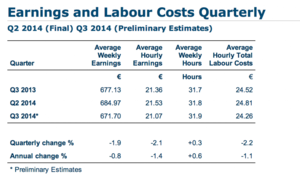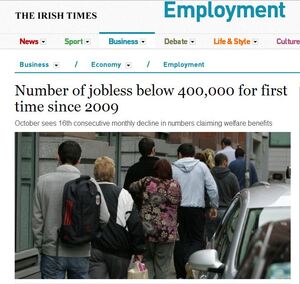The Central Statistics Office sez:
“Preliminary estimates show that average weekly earnings were €671.70 in Q3 2014, down 0.8% from €677.13 a year earlier. Revised weekly earnings were €684.97 in Q2 2014 and showed a decrease of 1.5% over the same period in 2013.”
“Other features of the preliminary results for Q3 2014 include: Average hourly earnings were €21.07 in Q3 2014 compared with €21.36 in Q3 2013, representing a decrease of 1.4% over the year. Average weekly paid hours were 31.9 in Q3 2014, an increase of 0.6% from 31.7 recorded in Q3 2013. Average hourly total labour costs stood at €24.26 in Q3 2014, a fall of 1.1% from the Q3 2013 value of €24.52.”
And…
“Over the 4 year period, Q3 2010 to Q3 2014, average weekly earnings across individual sectors show changes ranging between -12.1%, for the Education sector decreasing from €889.91 to €782.63, and +7.3%, for the Construction sector increasing from €661.65 to €709.82.”
There you go now.
Earnings and Labour Costs Quarterly (Central Statistics Office)







Explained well, by this commenter last week –
https://www.broadsheet.ie/2014/11/19/you-had-one-job-4/#comment-1236617
Average income is around €26,907, although that is based on a per household income (that is, total household income split evenly between adults) . Average, of course, is useless as a way of expressing what most people have to live on. Median income is usually the preferred marker, as it’s the most 50% of income earners take home. Based on Gross Income Distribution ‐ for individuals (2009 figures) the median was €18,076. http://www.nerinstitute.net/download/pdf/m_collins_living_wage_neri_may_1_2014.pdf “
And this commenter –
https://www.broadsheet.ie/2014/11/19/you-had-one-job-4/#comment-1236812
“Even if he did mean average wage – that’s almost as bad. As D points out above, the average is a meaningless statistic in this case because the ultra-rich drag the average up. Let’s say I run a company with 10 employees. I make a million a year out of the company and I pay everyone else minimum wage of €17,542.
1,000,000+(17,542*10)= 1175420 /11 = 106,856.40.
So there’s a company where the average wage is almost €107K per year! Pretty impressive, huh? The median is straight up €17,542 though, and a far more accurate portrayal of how much everyone actually makes. “
39 hours on minimum wages is near impossible to live on. You would want minuscule outgoings. Its a joke to expect some one to work for that pittance.
But you can take solace in the fact that the average earning is 21 euro per hour, for the average person shur.
Explained well, by this commenter last week –
broadsheet.ie/2014/11/19/you-had-one-job-4/#comment-1236617
Average income is around €26,907, although that is based on a per household income (that is, total household income split evenly between adults) . Average, of course, is useless as a way of expressing what most people have to live on. Median income is usually the preferred marker, as it’s the most 50% of income earners take home. Based on Gross Income Distribution ‐ for individuals (2009 figures) the median was €18,076. http://www.nerinstitute.net/download/pdf/m_collins_living_wage_neri_may_1_2014.pdf “
Discussions on median or average figures are a smokescreen. The earnings are down, whether average or median. That is what is important. These figures show people are working more hours and earning less from that extra time worked. A disgrace. Some recovery.
its cool lads put the calculators away, Enda Ken-ken says we all get about 35k a year anyway.
happy daze wha!
Lads a big part of this might be an increase in lower-end (say roughly €10 an hour) jobs.
Say I earn €20 an hour. Then someone comes along, gets off the dole, and earns €10 an hour. Average wage falls from €20 to €15.
This could be a big part of it. People coming off the dole probably aren’t automatically going in at their final salary before they were let go. I think unemployment generally falls before wages increase – seems to be happening in the US and UK like that anyway. Hopefully wages will begin to rise in time.
Who wants to be dumb and who wants to be dumber?
ah now…. strop that
Anne
12 of the 20 comments on here are from you. I think you need to step away from the keyboard.
Did you use your toes when you got past 10.
Make it 13… I might be back too! Nobody puts my keyboard in the corner.
Ha!